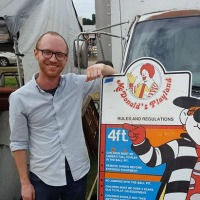
David Bliss (@davidallynbliss) is a Digital Processing Archivist at the Benson Latin American Collection at UT Austin who attended the 2017 DLF Forum with support from a Student and New Professional Fellowship.
Attending the DLF Forum in Pittsburgh helped me think about my work in a totally new way. I only recently graduated from my master’s program in May, and work in a contingent position which has me very focused on solving problems put in front of me. Every single panel and event I attended was worthwhile, stimulating, and challenging, but a few in particular helped me think critically about my career trajectory and how I can approach the work I’m doing right now.
“Valuing Labor in Digital Libraries” on Tuesday morning gave me some important ideas about organizing, particularly as a worker in a contingent position. I work in Texas, which is an aggressively anti-union environment, even if my university is a generally supportive workplace. Aside from convincing me that organizing is both possible and necessary in a right to work state like Texas (I learned that I’m represented by the Communication Workers of America in Texas!), the panel was useful in helping me think about the different organizing needs of different kinds of workers in libraries and archives. The needs of contingent and permanent workers are very different, and I had never considered the importance of separate (but allied) organizing meetings for each group until Graeme Slaght from the University of Toronto Libraries mentioned it. Emily Drabinsky from LIU-Brooklyn emphasized the “quotidian work” of organizing, found in everyday power-building and conversations with coworkers. I’ve spent a lot of time since DLF thinking about the ways I talk with coworkers about working conditions, especially conversations with other contingent workers about our lack of job security. I’d like to approach these conversations more deliberately and thoughtfully in the future to build power for improved working conditions.
Two other sessions on Tuesday, the Assessment Interest Group meeting and working lunch, also gave me a lot to think about, this time regarding how my digitization work can build on and contribute to the work of others. One of my position’s core responsibilities involves designing and launching digitization projects which I don’t actually supervise directly or work on myself. Funding for these digitization projects is time-limited, and we often only have very rough estimates of how many boxes we’ll be able to digitize with each project, which makes project proposals difficult. The Assessment Interest Group meeting and lunch gave me a chance to learn about the Digitization Cost Calculator, a tool for estimating the time and costs needed to digitize collections of a given size. Chrissy Rissmeyer from UCSB presented on the calculator and led the Cost Assessment working group lunch, where we discussed the need to collect more data to make the calculator more accurate. With several digitization projects coming in the next few years, I will use the cost calculator to more precisely estimate the time needed for each. I will also be more closely tracking the rate at which digitization project actually proceeds, and submitting that data to improve the accuracy of the calculator. This simple tool will have a big impact on my work, because as one of only two digital archivists at my institution I often feel like I’m left alone to reinvent the wheel. These sessions and others also helped me feel a lot less isolated in my digital work, and have encouraged me to actively contribute to the field, to make it as easy as possible for others in my situation to hit the ground running with digital projects.
